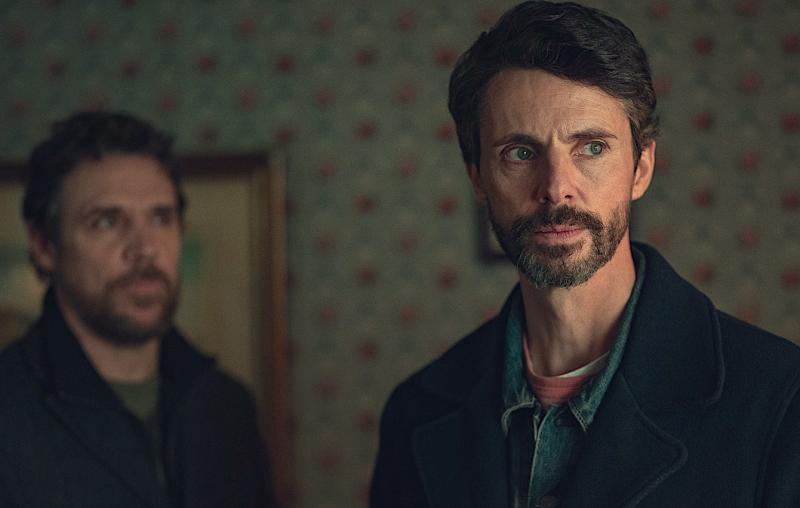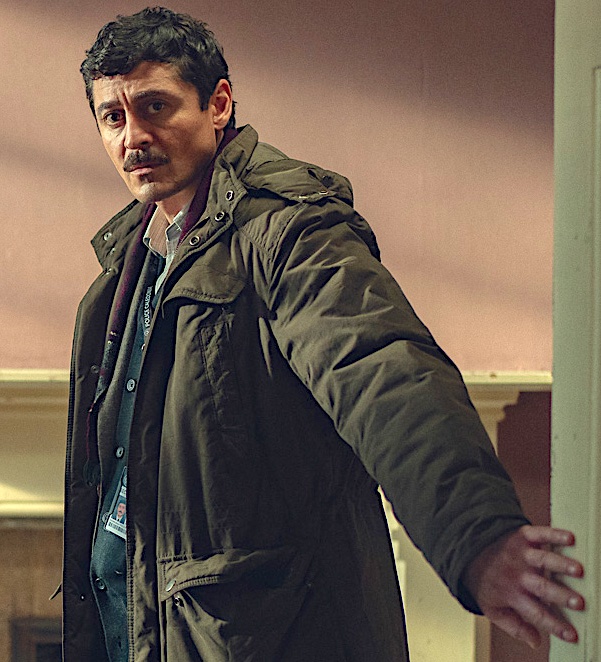Dept Q, Netflix review - Danish crime thriller finds a new home in Edinburgh | reviews, news & interviews
Dept. Q, Netflix review - Danish crime thriller finds a new home in Edinburgh
Dept. Q, Netflix review - Danish crime thriller finds a new home in Edinburgh
Matthew Goode stars as antisocial detective Carl Morck

Netflix’s new detective-noir is a somewhat cosmopolitan beast. It’s written and directed by an American, Scott Frank, derived from a novel, Mercy, by the Danish crime writer Jussi Adler-Olsen, and set in Edinburgh (as well as other flavourful Scottish locations). There are plenty of Scots in the cast too, although it’s the very English Matthew Goode (Downton Abbey, The Crown etc) who takes the lead role of DCI Carl Morck.
But Morck not only doesn’t have a very English name, but is far from your ideal English gentleman with a Lady Mary on his arm. The series opens with a brutal incident in which Morck and his partner, DI Hardy (Jamie Sives), are ambushed by a masked gunman, and repercussions of this echo through the developing story. Morck, already of a somewhat caustic and sardonic bent, now becomes almost a caricature of the cussed, argumentative, antisocial, rule-breaking, authority-defying loner who has become such a staple of crime dramas. He’s also shockingly good at beating people up.
Moreover, he follows in the tradition of such idiosyncratic detectives as Inspector Morse or Jim Bergerac or Saga Noren (from The Bridge) by driving an ostentatiously eccentric car, in his case a maroon-coloured Ford Sierra. Not in particularly good nick either, as Goode described in an interview in the Scottish Sun: “Occasionally I would turn the car off and walk away, and I’d hear it start up again, ha! I’d have to go over and give it a kick.”
 Morck's glowering mood is not improved when his boss, Chief Inspector Moira Jacobson (Kate Dickie), parks him in a derelict basement at police HQ and gives him about five million files of old cold cases to sort through, in the hope of finding one that might be successfully reopened. This is Dept. Q, though nobody seems to call it that.
Morck's glowering mood is not improved when his boss, Chief Inspector Moira Jacobson (Kate Dickie), parks him in a derelict basement at police HQ and gives him about five million files of old cold cases to sort through, in the hope of finding one that might be successfully reopened. This is Dept. Q, though nobody seems to call it that.
Happily, just as it’s beginning to look like he’s been given a one-way ticket to Dead End City, Morck is assigned an assistant, Akram Salim (Alexej Manvelov, pictured above). He’s apparently been doing something in IT, and isn’t technically a policeman. He’s very quiet and respectful, and we will learn that he has come to the UK after various kinds of unspecified unpleasantness in Syria. He resists Morck’s attempts to get him to tell him anything more, but actions speak louder than words, and Akram proves to have remarkable talents that will enable him to make several decisive interventions. His relationship with Morck is one of the most enjoyable things about Dept. Q. It’s also Akram who shrewdly picks out the case that Morck ends up pursuing, concerning the disappearance four years earlier of a lawyer called Merritt Lingard (Chloe Pirrie).
The series is a bit of a game of two halves, though those halves could have been made shorter by throwing away at least three of its nine episodes. It gets a little too high on its own supply of atmospheric locations and a lengthy roll-call of characters, and the final section where a resolution finally starts to hove into view crawls along with excruciating slowness, even when the outcome has become fairly predictable.
On the upside, the cast is strong and varied enough to allow plenty of punchy interactions. Dickie brings a sleeves-rolled-up pragmatism to the role of Jacobson, and Kelly Macdonald applies some nice touches of light and shade to Dr Rachel Irving, the shrink assigned to help Morck deal with his post-gunman trauma (needless to say, he makes a habit of not turning up for their sessions). Leah Byrne also excels as DC Rose Dixon, a young police officer eager for a chance to shine, which Morck is able to give her.
 As the narrative weaves its way through a tortuous tangle of historical wrongs, family trauma and toxic conspiracies, we encounter the ever-reliable Mark Bonnar as Stephen Burns, the Lord Advocate, who runs his legal empire with supercilious smoothness, and of course is harbouring some murky secrets. So is his weaselly underling Liam Taylor (Patrick Kennedy), a man reeking of untrustworthiness.
As the narrative weaves its way through a tortuous tangle of historical wrongs, family trauma and toxic conspiracies, we encounter the ever-reliable Mark Bonnar as Stephen Burns, the Lord Advocate, who runs his legal empire with supercilious smoothness, and of course is harbouring some murky secrets. So is his weaselly underling Liam Taylor (Patrick Kennedy), a man reeking of untrustworthiness.
Pirrie carries a heavy burden as Ms Lingard (pictured above), a talented and tenacious prosecutor who falls foul of both criminal skulduggery and a catastrophic family background that looms over her like a terrible curse. It is her fate to spend most of the series in a kind of purgatorial limbo, one of the worst aspects of which is that it has been devised by somebody resembling Dame Edna Everage’s deranged twin sister.
So there’s lots of good stuff here and some fine performances, but the show also has quite a few aspects which are either drearily drawn out or patently ludicrous when you stop to think about them. But if Netflix fancy giving Morck another go, there are nine more Adler-Olsen novels to choose from.
The future of Arts Journalism
You can stop theartsdesk.com closing!
We urgently need financing to survive. Our fundraising drive has thus far raised £49,000 but we need to reach £100,000 or we will be forced to close. Please contribute here: https://gofund.me/c3f6033d
And if you can forward this information to anyone who might assist, we’d be grateful.

Subscribe to theartsdesk.com
Thank you for continuing to read our work on theartsdesk.com. For unlimited access to every article in its entirety, including our archive of more than 15,000 pieces, we're asking for £5 per month or £40 per year. We feel it's a very good deal, and hope you do too.
To take a subscription now simply click here.
And if you're looking for that extra gift for a friend or family member, why not treat them to a theartsdesk.com gift subscription?
more TV
 The Paper, Sky Max review - a spinoff of the US Office worth waiting 20 years for
Perfectly judged recycling of the original's key elements, with a star turn at its heart
The Paper, Sky Max review - a spinoff of the US Office worth waiting 20 years for
Perfectly judged recycling of the original's key elements, with a star turn at its heart
 The Guest, BBC One review - be careful what you wish for
A terrific Eve Myles stars in addictive Welsh mystery
The Guest, BBC One review - be careful what you wish for
A terrific Eve Myles stars in addictive Welsh mystery
 theartsdesk Q&A: Suranne Jones on 'Hostage', power pants and politics
The star and producer talks about taking on the role of Prime Minister, wearing high heels and living in the public eye
theartsdesk Q&A: Suranne Jones on 'Hostage', power pants and politics
The star and producer talks about taking on the role of Prime Minister, wearing high heels and living in the public eye
 King & Conqueror, BBC One review - not many kicks in 1066
Turgid medieval drama leaves viewers in the dark
King & Conqueror, BBC One review - not many kicks in 1066
Turgid medieval drama leaves viewers in the dark
 Hostage, Netflix review - entente not-too-cordiale
Suranne Jones and Julie Delpy cross swords in confused political drama
Hostage, Netflix review - entente not-too-cordiale
Suranne Jones and Julie Delpy cross swords in confused political drama
 In Flight, Channel 4 review - drugs, thugs and Bulgarian gangsters
Katherine Kelly's flight attendant is battling a sea of troubles
In Flight, Channel 4 review - drugs, thugs and Bulgarian gangsters
Katherine Kelly's flight attendant is battling a sea of troubles
 Alien: Earth, Disney+ review - was this interstellar journey really necessary?
Noah Hawley's lavish sci-fi series brings Ridley Scott's monster back home
Alien: Earth, Disney+ review - was this interstellar journey really necessary?
Noah Hawley's lavish sci-fi series brings Ridley Scott's monster back home
 The Count of Monte Cristo, U&Drama review - silly telly for the silly season
Umpteenth incarnation of the Alexandre Dumas novel is no better than it should be
The Count of Monte Cristo, U&Drama review - silly telly for the silly season
Umpteenth incarnation of the Alexandre Dumas novel is no better than it should be
 The Narrow Road to the Deep North, BBC One review - love, death and hell on the Burma railway
Richard Flanagan's prize-winning novel becomes a gruelling TV series
The Narrow Road to the Deep North, BBC One review - love, death and hell on the Burma railway
Richard Flanagan's prize-winning novel becomes a gruelling TV series
 The Waterfront, Netflix review - fish, drugs and rock'n'roll
Kevin Williamson's Carolinas crime saga makes addictive viewing
The Waterfront, Netflix review - fish, drugs and rock'n'roll
Kevin Williamson's Carolinas crime saga makes addictive viewing
 theartsdesk Q&A: writer and actor Mark Gatiss on 'Bookish'
The multi-talented performer ponders storytelling, crime and retiring to run a bookshop
theartsdesk Q&A: writer and actor Mark Gatiss on 'Bookish'
The multi-talented performer ponders storytelling, crime and retiring to run a bookshop
 Ballard, Prime Video review - there's something rotten in the LAPD
Persuasive dramatisation of Michael Connelly's female detective
Ballard, Prime Video review - there's something rotten in the LAPD
Persuasive dramatisation of Michael Connelly's female detective

Add comment